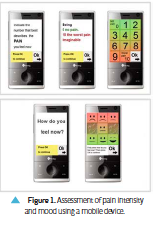By Azucena Garcia Palacios et al.
Chronic pain includes a wide range of medical conditions which cause a negative impact on the patient’s quality of life and is becoming an important public health problem. Fibromyalgia is among the most prevalent of chronic pain conditions.
It is estimated that around 0.7- 3.2% of the general population suffer from fibromyalgia. Most of them are women. It is important to develop assessment instruments and interventions from multidimensional and multidisciplinary approaches in order to provide a suitable response to fibromyalgia sufferers. These patients suffer widespread pain with fluctuations in intensity. Most patients report feeling some pain at all times and its intensity fluctuates depending on physical activity, mood, fatigue, and patterns of sleep.
The Initiative of Methods Measurement and Pain Assessment in Clinical Trials (IMMPACT) recommends the daily assessment of pain intensity. The gold standard for the assessment of pain intensity and other related variables are self-report ratings that the patient has to fill out daily. However, this assessment procedure presents limitations because the recollection is usually retrospective, it requires effort and patients are not always compliant. These limitations have an effect on the reliability of these measures. Information and communication technologies can help to improve the assessment of pain intensity and other related measures by making it easier for the patient to answer questions during programmed sessions throughout the day.

Our research team has developed an assessment tool (e-TI pain) running on a mobile device, in this case a cell phone, to recollect daily ratings of pain intensity, fatigue intensity and mood. The system has an alarm program that asks the patients to rate these measures on a daily basis. This tool allows data to be collected daily and facilitates prolonged assessment over time. It also allows a more reliable and non-retrospective assessment. Lastly, it requires less effort from the patient and it runs on a common device, the cell phone.
This assessment tool can contribute to a more reliable and valid assessment of core measures in the study of chronic pain. The design chosen has been carefully studied in order to be attractive and easy to use for middle-aged women with a very heterogeneous level of expertise in the use of information and communication technologies (Figure 1). The usability studies conducted support that the system is easy to use for most patients. At this moment, the system is being evaluated comparing its use with the use of a traditional handout and further data will be provided in the future.
Azucena Garcia-Palacios, Ph.D. Cristina Botella, Ph.D. Rocio Herrero, BA Yolanda Vizcaino, BA Diana Castilla, D., BA Universitat Jaume I
Rosa Maria Baños, Ph.D. Ciber Fisiopatologia Obesidad y Nutricion
Jaime Guixeres Industrial Engineer Universidad Politecnica de Valencia Spain azucena@psb.uji.es
About Brenda Wiederhold
President of Virtual Reality Medical Institute (VRMI) in Brussels, Belgium.
Executive VP Virtual Reality Medical Center (VRMC), based in San Diego and Los Angeles, California.
CEO of Interactive Media Institute a 501c3 non-profit
Clinical Instructor in Department of Psychiatry at UCSD
Founder of CyberPsychology, CyberTherapy, & Social Networking Conference
Visiting Professor at Catholic University Milan.








